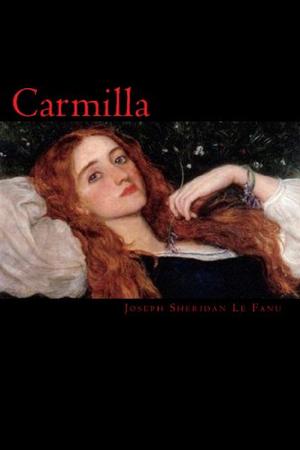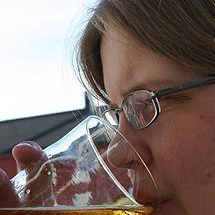LadyOfTheBooks
Carmilla
av Joseph Sheridan Le Fanu (forfatter).
IAP 2008 Paperback
LadyOfTheBooks' eksemplar av Carmilla
Lesetilstand
Ønsker meg denne.Hylle
Ønsker megLesedato
Ingen lesedato
Favoritt
Ingen favoritt
Terningkast
Ingen terningkast
Min omtale
Ingen omtale
Finn boka på biblioteket
Finner du ikke ditt favorittbibliotek på lista? Send oss e-post til admin@bokelskere.no med navn på biblioteket og fylket det ligger i. Kanskje vi kan legge det til!
Bokelskeres terningkastfordeling
2 2 3 0 1 0Bokomtaler
Dette er på ingen måte stor litteratur, men den hørespillversjonen jeg hørte, er riktig festlig. Audible sin med blant annet David Tennant.
I’m currently on an adventure through the classics of horror literature. Gothic fiction especially has turned out to be a marvelous discovery for me. Simply marvelous. Here I am, having arrived at one of the earliest vampire novels (novella?) ever written, and I’ve come to understand that some of the most prevalent ideas we have today about the vampire have their basis in this novel. Others from the first vampire novel from back in 1819, called The Vampyre by John William Polidori. There were other written vampire tales too before Dracula, actually, some by a handful of Frenhcmen and some Russians - like Guy de Maupassant and Nikolai Gogol. The first full-length vampire novel in English, though, is Varney the Vampire; or, The Feast of Blood (published periodically in penny dreadfuls from 1845-1847), but if you’re just as fascinated with vampires as I am, and just as enthralled by old school horror literature, “Carmilla” is considered an essential read. A classic.
I was not frightened, for I was one of those happy children who are studiously kept in ignorance of ghost stories, of fairy tales, and of all such lore as makes us cover up our heads when the door cracks suddenly, or the flicker of an expiring candle makes the shadow of a bedpost dance upon the wall, nearer to our faces. (13)
There are reasons why it’s regarded as a classic. Some of them I agree with, some of which I don’t agree with, but I’ll get back to that later.
First of all, the story is not too short, like for instance The Vampyre, and its’ not too long and inconsistent as Varney the Vampire; or, The Feast of Blood. Then there’s the tension, gradually intensifying paranoia and mystery of the plot, the eerie gothic setting, the darkly creepy and distress-inducing, but still very much sensual atmosphere. And the establishment of modern vampiric lore. Not to mention an important point: The protagonist is female, and the vampire antagonist is also a female, who preys on other women, through pure emotional manipulation and then draining them, of mental and physical strength, slowly, until they meet their demise.
My oh my!
“I thought I was receiving into my house innocence, gaiety, a charming companion for my lost Bertha. Heavens! What a fool have I been!” (19)
Much can be said about the vampires’ seductive behavior, about the bittersweet attraction that’s both hot and scary, enticing and dangerous. I won’t elaborate on this any further, as it can be interpreted in any number of ways, both culturally, economically, religiously, politically, psychologically etc., but it’s worth mentioning that Polidori first transformed the bestial, traditional vampire ghouls into the aristocratic, more captivating killer we know them to be today. And then Le Fanu fleshed them out, so to say, gave them more depth and complexity with “Carmilla”, and we should all be grateful for that. Especially as it served as inspiration for Dracula, the most important and most famous of all vampires.
“Why, she has been dead more than a century!"
"Not so dead as you fancy, I am told," answered the General. (128-129)
The modern literary vampire is honestly one of my favorite supernatural creatures. Every iteration I’ve come across in my life in books, films and TV-series have been absolutely fascinating to me. Their whole being is drenched in powerful contrasts: a hungry, vicious, cunning, coldhearted, even feral disposition. A forceful expression. But also a confident, regal, patient, wise, erotic and passionate energy about them. An emotionally charged air of capability. There’s something about that complexity of their nature that appeals to me. They’re timeless too, in a sense, both physically and philosophically, and I think I’ve yet to figure them out, which is part of the allure.
After all these dreams there remained on waking a remembrance of having been in a place very nearly dark, and of having spoken to people whom I could not see; and especially of one clear voice, of a female's, very deep, that spoke as if at a distance, slowly, and producing always the same sensation of indescribable solemnity and fear. (83)
Unfortunately, I didn’t find the vampire Carmilla as fascinating as I hoped her to be. She never strikes me as a dangerous and powerful vampire, but rather a weak and harmless one. She doesn’t seem very hungry for blood, only needy for it. Nor is she particularly clever or predatory. More like she’s immature, inexperienced, fickle and sort of cryptic. She also doesn’t have that air of ancient wisdom about her either, the kind of cold and calculating kind of intelligence that could only come from several human lifetimes of experiences as a vampiric hunter. No, actually, most of the time, she comes across as drunk, disoriented, absent-minded and exhausted. There are scenes where it seems like she knows what she’s doing, scenes with flashes of brilliance and determination, but they are few and far between. You’d have to wait until the ending to actually see her in action as a vampire, to feel her undead cunning and ruthlessness.
Under a narrow, arched doorway, surmounted by one of those demoniacal grotesques in which the cynical and ghastly fancy of old Gothic carving delights, I saw very gladly the beautiful face and figure of Carmilla enter the shadowy chapel. (140-141)
The reason why I feel this way is because there really isn’t any mystery to unravel when you already know that Carmilla is a vampire. The word “vampire” isn’t actually even mentioned until close to the end. Before that, both Carmilla and the connection between Laura and Carmilla is supposed to be this big mystery. I think those obscurities would’ve had a much greater effect on me if I knew nothing of her nature beforehand. This information kind of ruined the reading experience for me, as it diminished the uncomfortable mysteriousness, lessened the impact of the atmosphere and the gruesome reveal.
This is also the reason why I didn’t find the story all that compelling either. The haunting atmosphere and picturesque sceneries are too scarce, there are very few directly unsettling elements, not a lot of action or psychological terror and intense emotional distress. Too little of what makes gothic literature so great. And with that lack of speculation to arouse my curiosity and dread, things become more confusing than unnerving. The story also relies too heavily on foreshadowing, exposition and implications. It’s a slow, somber and moderately grievous read.
Without knowing it, I was now in a pretty advanced stage of the strangest illness under which mortal ever suffered. There was an unaccountable fascination in its earlier symptoms that more than reconciled me to the incapacitating effect of that stage of the malady. This fascination increased for a time, until it reached a certain point, when gradually a sense of the horrible mingled itself with it, deepening, as you shall hear, until it discolored and perverted the whole state of my life. (82)
To be honest, I expected a dark, forbidden love story that would haunt my nightmares with a dangerously erotic fantasy and images of a deadly, hypnotic vampire standing by the bedroom window, partially hidden behind some red velvet curtains and backlit by a hauntingly glowing silver moon, and there would be sharp fangs biting down on a willingly exposed neck, and a lustful gasp and lots of blood dripping down the …
Ahem.
All that to say: I’m not convinced.
One last thing:
Many people might disagree with me, and that’s okay, but I don’t think this is a queer story. By that I mean it doesn’t seem correct in labelling it as such. Don’t get me wrong, I really wanted it to be queer! I absolutely wanted it, I expected it and I was looking forward to it. But I didn’t see it, and I didn't feel it.
First of all, to me, for a story or book to be called queer, there needs to be someone in that story who feels, genuinely, either a romantic or sexual attraction. At the very least, they or someone else needs to realize this attraction, or act them out. Or be conflicted about it. Or the story needs to be about the living conditions of queer people, about being queer in a particular time or place. And one of these things needs to be explicit and clear.
Laura and Carmilla never engage in any sexual activities, and they actually never develop a romantic relationship. Not even a clandestine one. You could argue that they develop a deep level of emotional investment in each other. You could argue that they share intimate moments. But are these moments genuinely romantic and/or sexual? Especially if the word “friend” is used so frequently? Especially if Carmilla considers Laura her prey? If she is draining her of blood, of life, then Carmilla’s advances are never genuine. They’re tactical, so there would be no real love or attraction in her. Laura does find Carmilla beautiful, but finding beauty in others is universal to me (it's not unusual for straight women to see beauty in other women), and people can become emotionally invested in others without romantic feelings.
Her murmured words sounded like a lullaby in my ear, and soothed my resistance into a trance, from which I only seemed to recover myself when she withdrew her arms.
In these mysterious moods I did not like her. I experienced a strange tumultuous excitement that was pleasurable, ever and anon, mingled with a vague sense of fear and disgust. I had no distinct thoughts about her while such scenes lasted, but I was conscious of a love growing into adoration, and also of abhorrence. This I know is paradox, but I can make no other attempt to explain the feeling. (46-47)
I actually think that if I didn’t have prior knowledge, a presupposing one, of anything sapphic happening, I might have viewed their relationship in a different light, enjoyed it even more on another level. I was actively looking for romantic love to grow and deepen with every interaction between Laura and Carmilla, so that clouded my judgement of the story. But Laura doesn’t identify as queer/lesbian, they don’t develop a genuine romantic relationship, no one talks about the experience of being queer. It’s simply not being addressed.
Carmilla is more likely, in my opinion, to be using vampiric powers to falsely create a sense of attraction in Laura, who doesn’t seem to think of Carmilla as a lover or a romantic partner. It’s too ambiguous, and honestly, a huge wasted opportunity. I was disappointed, because I see the appeal. I wanted it too, believe me, but the lesbian overtones are simply that: interpretations. Suggestive. Evocative. Wishful thinking.
If I take a step back, their relationship (before knowing Carmilla is a vampire) is a story about loneliness and friendship and human connection, where Carmilla brightens up and enriches Laura’s sad and solitary existence. And vice versa. Platonic relationships can also be very lovely and powerful.
You, who live in towns, can have no idea how great an event the introduction of a new friend is, in such a solitude as surrounded us. (36)
I just don’t think the queer label is warranted because of that ambiguity. That’s all.
And it just lessened the reading experience for me. For some, the ambiguity is thrilling and promising and enticing, and that’s arguably part of what makes this book come alive, makes it a great classic. That act of reading and experience is still valid, and I appreciate that. It certainly makes it even more memorable and inspirational.
The effect of the full moon in such a state of brilliancy was manifold. It acted on dreams, it acted on lunacy, it acted on nervous people, it had marvelous physical influences connected with life. (22)
So, if you haven’t read “Carmilla” yet and are looking for a lesbian love story/a lesbian erotic affair, or if you’re looking for a gothic horror vampire story, don’t get your hopes up too much.
But if you’re interested in reading “Carmilla” to explore the horror genre’s historical context and development, and for the lore of the literary vampire, then I would recommend it. Personally, it’s not that bad, by all means. I hope I've managed to convince of you that it has some noteworthy moments of gothic beauty and trepidation. I’s just not that amazing either.
Skriv en omtale Se alle omtaler av verket
Diskusjoner om boka
Ingen diskusjoner ennå.
Start en diskusjon om verket Se alle diskusjoner om verket

















